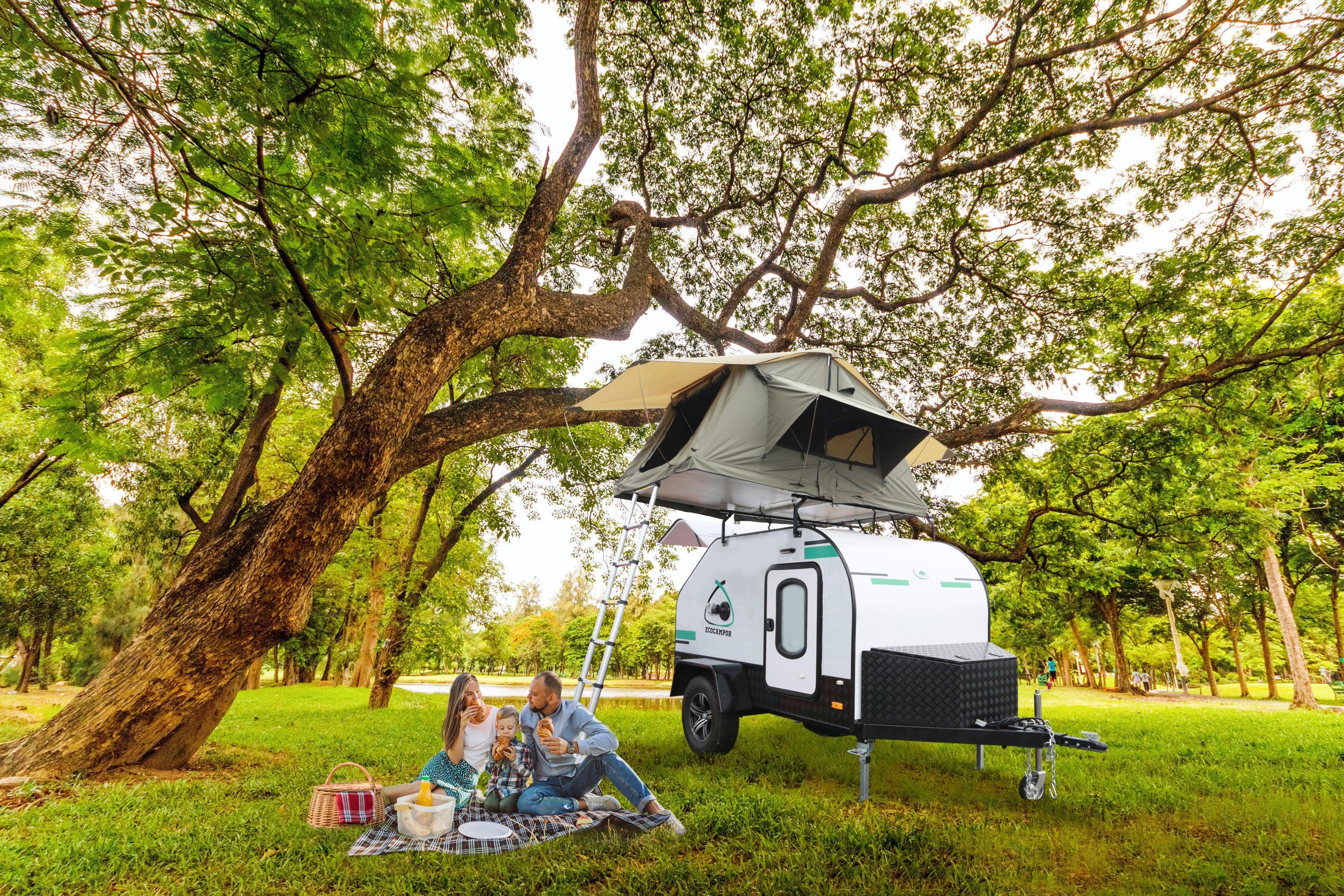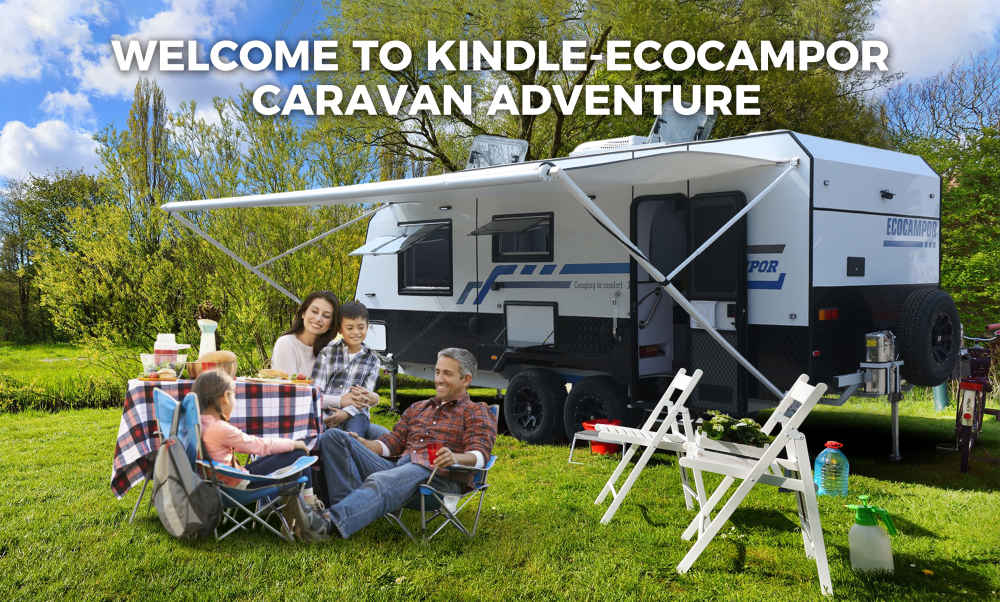Off Road Camper Trailers and Traditional RVs Which Offers More Comfort

Comfort means different things to different people. Some like the roomy space and cosy features of an RV. Others prefer the tough and flexible design of an off road camper trailer. What you pick depends on your idea of comfort and fun. If you want luxury and a home-like feel, an RV is ideal. But if you enjoy travelling to far-off places, off road camper trailers are great for exploring.
More people are buying RVs and off road camper trailers now. In 2020, about 11 million families in North America owned RVs. Off road camper trailer sales also grew by 17% in 2023. This rise shows people love custom trips and outdoor adventures.
Key Takeaways
RVs have large spaces and fancy features, great for families.
Off-road camper trailers are light and simple to pull, ideal for adventurers.
Think about your travel style and money; camper trailers usually cost less.
RVs have better kitchens and bathrooms, but trailers are easier to move.
Decide what you need; comfort or flexibility will help you choose.
Space and Amenities in RVs vs Travel Trailers
Living Space Comparison

RVs and travel trailers have very different living spaces. RVs are bigger and feel like a house on wheels. They have separate areas for sleeping, eating, and relaxing. Travel trailers are smaller and lighter, making them easier to tow. They focus on being portable rather than spacious.
Feature | RVs | Travel Trailers |
|---|---|---|
Size | Bigger, like a small home | Smaller and easier to move |
Amenities | More luxury features | Basic, with some fancy options |
Cost | Costs more to buy and maintain | Cheaper to buy and keep |
If you like lots of space and home comforts, choose an RV. But if you want something simple and easy to tow, pick a travel trailer.
Sleeping Arrangements
RVs and travel trailers also differ in sleeping setups. RVs often have proper bedrooms with big beds, even king-size ones. These are great for families and offer privacy. Travel trailers usually have fold-out sofas or tables that turn into beds. Some fancy models have queen-size beds, but space is tighter.
For families or groups, RVs give more room to sleep comfortably. For couples or solo travellers, travel trailers work just fine.
Kitchen and Bathroom Facilities
RVs are better for kitchens and bathrooms. Many have full kitchens with ovens, microwaves, and big fridges. Bathrooms often have separate showers, sinks, and toilets, like at home. Travel trailers usually have smaller setups. You might get a tiny kitchen with a small stove and fridge. Bathrooms, if included, are often cramped and combined.
If you love cooking or need a roomy bathroom, an RV is best. Travel trailers are good for simple cooking or using campsite facilities.
Storage Capacity
RVs and travel trailers handle storage in different ways. RVs usually have more built-in storage spaces. You can find cabinets above, compartments under beds, and outside storage areas. These features make RVs great for long trips with lots of items.
Travel trailers focus on being small and efficient. They have fewer cabinets and smaller compartments. This design keeps them light and easy to pull. Some special travel trailers, like toy haulers, are different. They have a big garage space with tie-downs for bikes, ATVs, or other gear.
Here’s a simple storage comparison:
Feature | Travel Trailer | Toy Hauler |
|---|---|---|
Storage Capacity | Basic storage options |
If you need to carry many things, an RV is better. But if you love outdoor fun and need space for big gear, a toy hauler is a smart choice.
Tip: Think about what you’ll bring on trips. This helps you pick the best storage option.

Mobility and Accessibility of Off Road Camper Trailers
Terrain Adaptability
Off-road camper trailers are great for tough landscapes. They are built strong and flexible, perfect for rough terrain. Features like steel frames and strong suspension help them handle bumpy roads. Their high-clearance design makes rocky paths and muddy trails easier to cross.
Traditional RVs work best on smooth roads and in RV parks. Off-road trailers let you explore faraway places in nature. For example, the GOAT 'Go All-Terrain' trailer has special tyres and a strong suspension system. It offers 18 inches of ground clearance and a 42-degree departure angle. This makes it easy to travel on hard terrain.
If you love exploring the wild, off-road trailers are ideal. They use tough materials like steel and aluminium to stay strong but light. This makes them easier to move around.
Ease of Towing or Driving
Off-road camper trailers are simple to tow. They are small and light, making them easier than big RVs. Teardrop trailers are a favourite for outdoor trips because they are easy to handle.
Travel trailers can sway when towed, but a weight hitch helps. Off-road trailers are smaller, so you can use more vehicles to tow them. They also fit into more camping spots, saving money and offering flexibility.
RVs are harder to drive and park because they are bigger. They are better for staying in one place for a long time. If you want easy towing, off-road trailers are the best choice.
Parking and Manoeuvrability
Off-road camper trailers are easy to park and move. Their small size fits into tight spaces, even in remote areas. This is helpful when parking spots are limited.
Their lightweight design makes them simple to handle. Strong suspension and high-clearance designs help them on narrow paths and uneven ground.
RVs are bigger and need more space to park. They are not great for quick stops in remote places. If you want easy parking and movement, off-road trailers are a smart pick for adventures.
Maintenance and Costs of RVs vs Travel Trailers
Upkeep and Repairs
Taking care of an RV costs more than a travel trailer. Big motorhomes need regular servicing because of their complex systems. Fixing an RV can cost between $500 and $2,000, depending on the problem. Insurance adds $100 to $500 each year. Weather damage repairs can go up to $5,000 due to their size and exposure.
Travel trailers are smaller and simpler, so they cost less to maintain. Their light design causes less damage to towing vehicles, saving money over time. But you still need to check the tyres and suspension often, especially for rough trips.
Tip: Check your vehicle before and after trips. This avoids expensive repairs.
Fuel Efficiency and Running Costs
Fuel use is important when comparing RVs and travel trailers. Big RVs like the Winnebago Navion get 18-20 miles per gallon (MPG). The Winnebago View gives about 16.5 MPG, showing how much fuel motorhomes need.
Travel trailers use less fuel. Their light build makes towing easier and improves MPG. Diesel towing vehicles save more fuel than petrol ones. Shorter trailers are lighter, easier to tow, and use less fuel.
Note: Pick a light trailer and fuel-saving towing vehicle. This lowers your costs.
Long-Term Affordability
Travel trailers are cheaper in the long run. A CBRE Hotels Advisory Group study says RV trips can be 60% cheaper for families of four. Couples save about 46% compared to other travel options.
RVs cost more to buy, but budget models make them affordable. Travel trailers are cheaper to buy and maintain. Staying at low-cost campsites and cooking your meals saves even more money.
If saving money is your goal, travel trailers are a great choice. But if you want luxury, an RV might be worth it.
Use Cases for Off Road Camper Trailers and RVs
Best for Off-Grid Adventures
Off-road camper trailers are great for wild camping trips. They are strong and have better suspension for rough paths. Special hitches help them handle bumpy and uneven roads. These features make exploring faraway places easy and exciting.
Their small size lets them go where big RVs cannot. Whether on rocky trails or sandy areas, they stay comfy and useful. For example, the Ecocampor Modern Small Teardrop Off Road Camper Trailer is tough and has basic comforts. It’s perfect for long stays in nature.
If you love camping in quiet, remote spots, choose off-road trailers. They let you enjoy nature while keeping some home comforts.
Best for Family Road Trips
RVs are great for family trips. They are big and have many sleeping spaces for everyone. You get separate areas for cooking, relaxing, and sleeping. This makes RVs perfect for long trips where comfort matters.
Many families and older people like RVs. In 2024, 81.1 million Americans went camping, with 61% of older campers using RVs. Families pick RVs because they fit everyone and make long trips fun and easy.
If you’re planning a trip with family, an RV is a great choice. It gives space, comfort, and luxury for making happy memories together.
Best for Long-Term Travel
Both RVs and travel trailers are good for long trips. RVs feel like a full home with kitchens, bathrooms, and lots of storage. They are best if you want to stay in one place for a while.
Travel trailers are lighter and easier to tow. They let you move around easily and cost less. This makes them a smart choice for saving money on long trips.
The RV and trailer market is growing fast. By 2031, it might reach USD 49.85 billion because more people enjoy outdoor adventures. This shows how popular these travel options are becoming.
If you’re going on a long trip, think about what you need. Pick an RV for comfort and staying put or a trailer for moving around and saving money.
Best for Budget-Friendly Travellers
If you want to save money while travelling, off-road camper trailers are a great option. They cost less than traditional RVs, making them ideal for budget-conscious explorers.
Buying a camper trailer is much cheaper. Traditional RVs can cost $30,000 to over $50,000. In contrast, pop-up trailers or small off-road models range from $10,000 to $25,000. This price difference lets you spend on other travel needs or save for future adventures.
Aspect | Pop-Up Trailers | Traditional RVs |
|---|---|---|
Average Purchase Price | $10,000 - $25,000 | $30,000 - $50,000+ |
Insurance Premiums | Lower | Higher |
Storage Costs | Reduced | Higher |
Fuel Economy | Better | Less efficient |
Insurance and storage are cheaper for camper trailers. Their smaller size makes them less expensive to insure. You can often store them at home, avoiding costly storage fees. Camper trailers are also lighter, using less fuel and lowering travel costs.
Using a camper trailer can make holidays more affordable. Studies show RV trips are up to 60% cheaper for families of four than other travel types. Couples save about 46% on average. These savings come from lower accommodation costs and cooking your meals instead of eating out.
Tip: Think about your travel style and budget. A camper trailer could be the best way to explore without spending too much.
For those focused on saving money, off-road camper trailers offer a practical and affordable way to travel. They help you enjoy the open road without overspending.
Deciding between an RV and an off-road camper trailer depends on how you like to travel. RVs are cosy and luxurious, great for family holidays or long stays. Off-road camper trailers are tough and easy to move, ideal for wild adventures.
Think about what matters most to you. Do you want roomy spaces and home-like features? Or do you need something light and simple to tow? Choose based on your travel goals and the kind of trips you enjoy.
Tip: Take time to understand your needs before buying. This helps you pick the right option for your lifestyle and budget.
FAQ
What’s the difference between a camper trailer and campervan?
A camper trailer is pulled by a vehicle. It’s small and light for easy towing. A campervan is a van with built-in living space. You can drive it as one unit.
Are off-road camper trailers good for families?
Yes, families can use off-road camper trailers. Many have beds for several people and outdoor kitchens. They’re great for families who love exploring wild places.
Why choose travel trailers over driveable RVs?
Travel trailers cost less and are simpler to care for. You can unhook your car for local trips. Driveable RVs combine driving and living spaces, which is handy for long travels.
Is towing a travel trailer hard for beginners?
Towing takes practice but isn’t too hard to learn. Smaller trailers are easier to manage. Using a weight hitch and practising in open areas helps build confidence.
Can camper trailers handle rough ground?
Yes, many camper trailers are made for tough terrain. They use strong materials, high-clearance designs, and sturdy suspension to handle bumpy paths.
See Also
Comparing Mini Camper Trailers And RVs For Best Value
Simplifying Off-Road Living With A 16ft Caravan
Enhance Your Camping Experience With Travel Trailers Now
